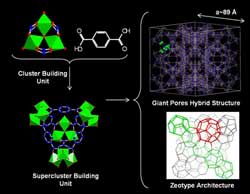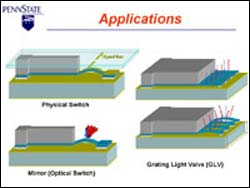Materials management deals with the research, development, manufacturing and processing of raw and industrial materials. Key aspects here are biological and medical issues, which play an increasingly important role in this field.
innovations-report offers in-depth articles related to the development and application of materials and the structure and properties of new materials.

Synthesis of Yttrium Aluminum Garnet by modifying the citrate precursor method
Yttrium Aluminum Garnet (YAG) is an important material used in the production of laser systems, for coating electronic devices, for tubes of cathodic rays and recently it has been considered as a suitable material for structural applications at high temperatures. In order to be successful in these applications the material properties such as optical properties, chemical stability at high temperature

Science researchers from the University of Versailles (France), in collaboration with the ID31 beam line at the European Synchrotron Radiation Facility (ESRF), report their progress in the design and characterisation of microporous materials. The combination of adept chemistry and computational design made possible the synthesis of a new material, named MIL-101 by its originators, (where MIL stands for Matériaux de l’Institut Lavoisier), with very large internal pores (ø~3.4nm) and surface area

Using a new precision bonding process they developed, Penn State researchers have designed and fabricated tiny new piezoelectric microactuators — the largest only a hair’s breadth wide — based on coupling commercially available materials with existing micromachining technology.
The new actuators promise to be low cost, and capable of providing controlled force, high resolution and large displacements appropriate for applications in RF switches for cell phones, for exa

Fracture toughness of Si3N4/S45C joint with an interface crack
Ceramic/metal joints have been increasingly applied in a wide range of engineering fields because the ceramic has stable mechanical properties at high temperature and good resistance to wear, erosion and oxidation. However, the difference of material properties between metal and ceramic induces stress singularities at the interface edge. The stress singularity together with the thermal residual stress degrades the st

Effect of P2O5 and chloride on clinkering reaction
Korean ceramics researchers have recently investigated the potential for using sewerage sludge in cement production. Their research looks at the possibility of effective reutilization of sewage sludge into cement kiln processes. They describe their findings in the online materials science journal AZojomo*.
Increasing environmental regulations on marine dumping means new disposal methods must be found for sewerage sludge.

Preparation and characterization of Li1-xNi1+xO2 powder used as cathode materials
Lithium batteries increasingly permeate our lives in all manner of electrical devices. Researchers from Thailand report on a study that investigates the use of the sol-gel method to produce battery cathodes from a new material. They describe their findings in the online materials journal AZojomo*.
For some time LiNiO2 has been a promising cathode material due to its large discharge capa